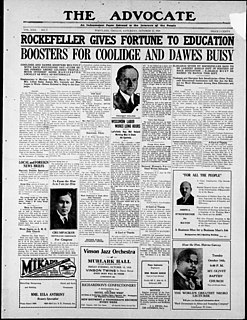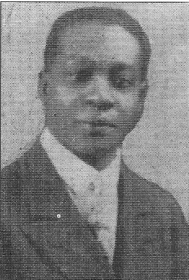Related Research Articles

The Civil Rights Act of 1964 is a landmark civil rights and labor law in the United States that outlaws discrimination based on race, color, religion, sex, and national origin. It prohibits unequal application of voter registration requirements, racial segregation in schools and public accommodations, and employment discrimination. The act "remains one of the most significant legislative achievements in American history".

Augustus Freeman Hawkins was a Democratic Party politician who advocated for Civil Rights and organized labor. Over the course of his career, Hawkins authored more than 300 state and federal laws, the most famous of which are Title VII of the Civil Rights Act of 1964 and the 1978 Humphrey-Hawkins Full Employment Act. He was known as the "silent warrior" for his commitment to education and ending unemployment.

In the history of the United States, carpetbagger is a largely historical term used by Southerners to describe opportunistic Northerners who came to the Southern states after the American Civil War, who were perceived to be exploiting the local populace for their own financial, political, and/or social gain. The term broadly included both individuals who sought to promote Republican politics, and individuals who saw business and political opportunities because of the chaotic state of the local economies following the war. In practice, the term carpetbagger was often applied to any Northerner who was present in the South during the Reconstruction Era (1865–1877). The term is closely associated with "scalawag", a similarly pejorative word used to describe native White Southerners who supported the Republican Party-led Reconstruction.

The National Woman's Party (NWP) was an American women's political organization formed in 1916 to fight for women's suffrage. After achieving this goal with the 1920 adoption of the Nineteenth Amendment to the United States Constitution, the NWP advocated for other issues including the Equal Rights Amendment. The most prominent leader of the National Woman's Party was Alice Paul, and its most notable event was the 1917–1919 Silent Sentinels vigil outside the gates of the White House. As of January 1, 2021, NWP has ceased operations as its own independent non-profit and has assigned its trademark rights and other uses of the party's name to the Alice Paul Institute. The Alice Paul Institute has invited three members of NWP Board of Directors to join their board and in the near future will created a new committee to "advise on a potential expansion of programs to the Washington, DC area and nationally".
This is a list of notable events in the history of LGBT rights that took place in the year 2005.

Howard Worth Smith was an American politician. A Democratic U.S. Representative from Virginia, he was a leader of the informal but powerful conservative coalition.

Aaron Henry was an American civil rights leader, politician, and head of the Mississippi branch of the NAACP. He was one of the founders of the Mississippi Freedom Democratic Party which tried to seat their delegation at the 1964 Democratic National Convention.
White primaries were primary elections held in the Southern United States in which only white voters were permitted to participate. Statewide white primaries were established by the state Democratic Party units or by state legislatures in South Carolina (1896), Florida (1902), Mississippi and Alabama, Texas (1905), Louisiana and Arkansas (1906), and Georgia (1900). Since winning the Democratic primary in the South almost always meant winning the general election, barring black and other minority voters meant they were in essence disenfranchised. Southern states also passed laws and constitutions with provisions to raise barriers to voter registration, completing disenfranchisement from 1890 to 1908 in all states of the former Confederacy.

The Advocate was a four-page weekly newspaper in Portland in the U.S. state of Oregon, established to cover issues relating to racial minorities. It was founded in 1903; microfilm of the paper is available through 1933, and the paper was covered as an active entity in other Portland press until at least 1936. The Advocate was known as Portland's second oldest black newspaper. In 1933 when the paper ceased publication it was the only remaining black-owned newspaper In its early days, it was known as the Mt. Scott Herald and possibly as the Beaver State Herald. The Advocate covered a variety of topics for both the white and black communities in Portland. The Advocate mainly covered segregation, lynching, employment opportunities and other issues at the beginning.
The Houston LGBTQ+ Political Caucus is the South's oldest civil rights organization dedicated solely to the advancement of gay, lesbian, bisexual and transgender rights. It was founded in 1975, and is the largest LGBTQ political organization in the city of Houston and Harris County. It is known locally simply as "The Caucus." The Caucus is nonpartisan and endorses candidates on the basis of their support for LGBTQ rights, regardless of political party or candidate's sexual orientation.
Louis Austin (1898-1971) was an African-American journalist, civic leader and social activist. Austin purchased The Carolina Times in 1927 and transformed it into an institution that aided African Americans in their fight for freedom and equality in North Carolina. He used a new approach to civil rights issues in Durham, incorporating lower and middle class blacks, unlike the moderate, accommodationist approach of the black elite in Durham during this time. Austin's unusual strategy of advocating for the majority of blacks to have a voice in society succeeded in galvanizing a broader segment of the African American community in Durham to act for social change. Austin's approach to black activism helped lay the groundwork for the modern Civil Rights Movement in Durham in the late 1950s and 1960s, which also encouraged lower-income blacks to become politically active. His strategies—which were once considered too radical by his peers—allowed Austin to maintain his influence in Durham well into the 1950s and 1960s. In doing so, Austin created a lasting impact for Durham.

Jared Ryker Woodfill V is a Texas lawyer and political figure who was chairman of the Harris County Republican Party who from 2002 to 2014. He was elected chairman of the county party for six two-year terms. After being ousted from the chairmanship of the county party in 2014, Woodfill launched two unsuccessful campaigns for the chairmanship of the Texas Republican Party. Woodfill is known for his socially conservative views activism, including his opposition to the Houston Equal Rights Ordinance, which was repealed in a 2015 referendum.

Carter Walker Wesley was an American lawyer, newspaperman and political activist.
The following is a timeline of Latino civil rights in the United States.

Lulu Belle Madison White was a teacher and civil rights activist in Texas during the 1940s and 1950s. In 1939, White was named as the president of the Houston chapter of the National Association for the Advancement of Colored People (NAACP) before becoming executive secretary of the branch in 1943. Under her leadership, the Houston chapter of the NAACP more than doubled in size from 1943 to 1948.
The Texas Freeman was a newspaper for African Americans established in 1893 in Houston, Texas. It was established by Charles N. Love along with his wife Lilla as well as Jack Tibbitto, and Emmett J. Scott who became its editor. It was the city's first African American newspaper. The paper eventually merged with the Houston Informer to become the Houston Informer and Texas Freeman.

The W. L. D. Johnson Neighborhood Library is a Houston Public Library branch in Houston, Texas. It replaced the Carnegie Colored Library, a Carnegie Library established by Houston's African American community in the Fourth Ward that was demolished for Interstate Highway 45 construction in 1962. The current branch is located at 3517 Reed Road. The library is named after W.L.D. Johnson, Sr., a man who raised funds for the purchase of the Carnegie Colored Library and served on the board of directors of that library. The new library building was dedicated on June 16, 1964 and replaced the original Carnegie Colored Library.

Maud E. Craig Sampson Williams was an American suffragist, teacher, civil rights leader, and community activist in El Paso, Texas. In June 1918, she formed the El Paso Negro Woman's Civic and Equal Franchise League and requested membership in the National American Woman Suffrage Association (NAWSA) through the Texas Equal Suffrage Association (TESA), but was denied. Williams organized African-American women to register and vote in the Texas Democratic Party primary in July 1918. She was one of the founders and a charter member of the El Paso chapter of the NAACP, which was the first chapter in the state of Texas. Williams served as the vice president of the El Paso chapter from 1917 to 1924 and remained active in the NAACP until her death. Williams played a significant role in the desegregation of Texas Western College in 1955, which was the first undergraduate university in Texas to be desegregated.

The women's poll tax repeal movement was a movement in the United States predominantly led by women that attempted to secure the abolition of poll taxes as a prerequisite for voting in the Southern states. The movement began shortly after the ratification in 1920 of the Nineteenth Amendment to the United States Constitution, which granted suffrage to women. Before obtaining the right to vote, women were not obliged to pay the tax, but shortly after the Nineteenth Amendment became law, Southern states began examining how poll tax statutes could be applied to women. For example, North and South Carolina exempted women from payment of the tax, while Georgia did not require women to pay it unless they registered to vote. In other Southern states, the tax was due cumulatively for each year someone had been eligible to vote.
References
- ↑ Govenar, Alan B. (2010). Lightnin' Hopkins: His Life and Blues. Chicago Review Press. ISBN 9781556529627.
- 1 2 3 Hall, David D. (8 October 2015). A History of the Book in America, 5-volume Omnibus E-book: Includes all Five Volumes. UNC Press Books. ISBN 9781469628967 – via Google Books.
- ↑ "Though The Heavens Fall, Part 1".